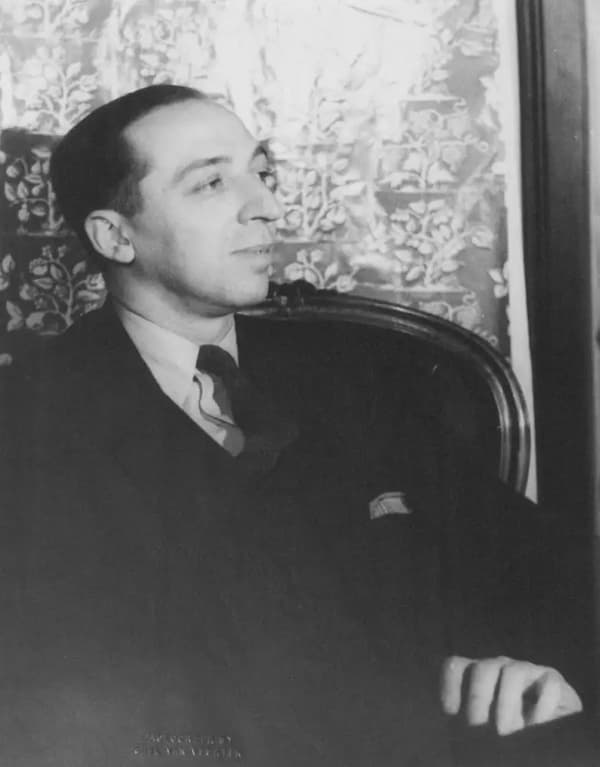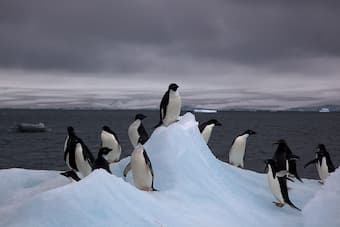
Adelie Penguins on iceberg
Our incredible planet is in real trouble. Scientists have identified a triple-threat of climate change, biodiversity loss and overpopulation as humanity is racing “towards mass extinctions, health crises and constant climate-induced disruptions to society.” Earth has lost an estimated 50% of its terrestrial plants and roughly 20% of its animal biodiversity, and global warming due to human activities is estimated to have increased “Earth’s global average temperature by about 2 degrees Celsius since the pre-industrial period.” It’s rather depressing, but “human-caused global warming and associated climate change are irreversible and already have observable effects on the environment.”

Antarctica
We are seeing more intense heat waves, loss of sea ice, accelerated rise in sea levels and the melting of glaciers. The Artic Ocean is expected to become essentially ice free before mid-century, and in a century or two, the Antarctic will probably be unrecognizable. The southernmost continent has become a symbol of the effects of climate change, and leading scientists and policymakers are pushing for stronger environmental protections for the region. Fortunately, our relationship with nature is gradually changing, and Ralph Vaughan Williams and Maxwell Davies reflect that change of attitude in their respective “Antarctic Symphonies.”
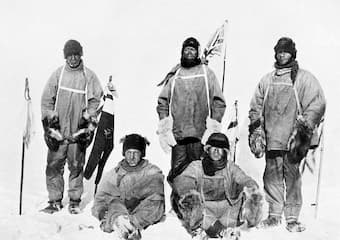
Robert Falcon Scott’s Pole party of his ill-fated expedition
Between 1910 and 1912, Captain Robert Falcon Scott was in a race with Roald Amundsen to become the first human to reach the South Pole. The British expedition spent years preparing and endured terrible conditions, but when the team of five arrived at the Pole on 17 January 1912, the Norwegian team had beaten them. Things went from bad to worse on the 850-mile return journey as temperatures plummeted and food stores became depleted. The three surviving members of the team built their last camp on Monday 19 March and they all died around 31 March 1912, only eleven miles from the safety of their base camp.
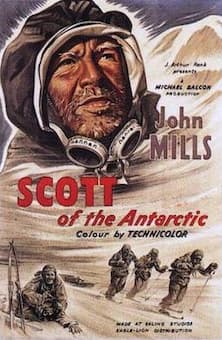
Scott of the Antarctic movie poster
This man against nature struggle attracted Ealing Studios, and in 1946 the film company started work on “Scott of the Antarctic.” Ernest Irving, the music director of Ealing Studios, said: “It did not take me fifty seconds to decide whom I should suggest as composer of the music—Ralph Vaughan Williams. Vaughan Williams had already composed music for five films, and he was undoubtedly “inspired by the courage, leadership, and fortitude that Scott showed when faced with appalling conditions.” The film was first shown at a Royal Command Performance at the Empire Theatre, London on 29 November 1948.
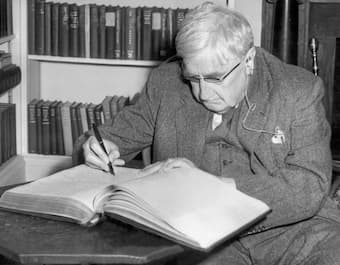
Ralph Vaughan Williams
Working on the film score to “Scott of the Antarctic” had a profound impact on the composer. The tribute to the heroism of Scott and his companions provided “Vaughan Williams with a necessary stimulus for optimism, after the perceived desolation of his Sixth Symphony, which some had seen as a war symphony. Scott exemplified admirable qualities of loyalty, courage, firmness of purpose and, indeed, all that seemed best in the human spirit.” As such, Vaughan William used the music he had written for the film and expanded it into his Seventh Symphony, a work subtitled “Sinfonia Antartica.” The work was completed in 1951, and first performed under John Barbirolli with the Hallé Orchestra and soprano soloist Margeret Ritchie, in Manchester, on 14 January 1953. Cast in five movements, each movement is prefaced in the published score by an epigraph selected by the composer. The opening “Prelude” features the following quotation from Shelley’s Prometheus Unbound.
To suffer woes which hope thinks infinite,
To forgive wrongs darker than death or night,
To defy power which seems omnipotent,
Neither to change, nor falter, nor repent:
This… is to be
Good, great, joyous, beautiful and free,
This is alone life, joy, empire and victory.
Ralph Vaughan Williams: Symphony No. 7, “Sinfonia antartica” (Prelude) (John Gielgud, narrator; London Philharmonic Choir; London Philharmonic Orchestra; Adrian Boult, cond.)
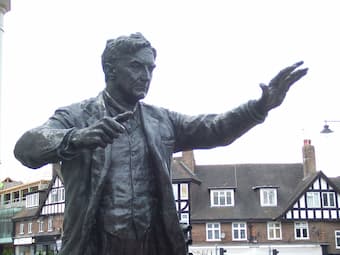
Statue of Ralph Vaughan Williams
The opening theme is taken from the title sequence of the film, “revealing the epic, vast, terrifying grandeur of the Antarctic.” The slow marching theme does suggest the heroic efforts in the face of overpowering natural forces, and “Antarctic shimmerings,” as the composer called it, becomes a prelude to a wordless soprano solo. A critic writes, “Over xylophone, piano, and harp, the female voices add a disembodied element to the music, conjuring up icy wastelands, to which the wind machine contributes its own haunting atmosphere… A trumpet fanfare suggests some grounds for optimism as Man sets out to confound Nature.” The “Scherzo” movement is prefaced by words from Psalm 104.
There go the ships
and there is that Leviathan
whom thou hast made to take his pastime therein.
Ralph Vaughan Williams: Symphony No. 7, “Sinfonia antartica” (Scherzo) (John Gielgud, narrator; London Philharmonic Orchestra; Adrian Boult, cond.)
A descending motif in the woodwind, tuba, and cellos does indeed represent the Leviathan in the form of a whale or two. Penguins are found in the trumpet and trombones, as Vaughan Williams makes use of an incredible array of orchestral color. The movement ends, as Vaughan Williams put it, “softly on an indefinite chord for muted brass and celesta.” The emotional core of the “Sinfonia antartica” lies in the slow movement titled “Landscape.” It is prefaced by a quotation taken from Coleridge’s “Hymn before Sunrise, in the Vale of Chamouni.”
Ye ice fallst Ye that from the mountain’s brow
Adown enormous ravines slope amain-
Torrents, methinks, that heard a mighty voice,
And stopped at once amid their maddest plunget
Motionless torrents! Silent cataracts!
Ralph Vaughan Williams: Symphony No. 7, “Sinfonia antartica” (Landscape) (John Gielgud, narrator; London Philharmonic Orchestra; Adrian Boult, cond.)
This atmospheric movement captures the lonely landscape of snow and ice described in the poem. Orchestral coloring evokes a frozen stillness and eerie wilderness before a terrifying organ passage alludes to the impassible nature of the terrain. The “Intermezzo” is introduced by a quotation from John Donne’s “The Sun Rising.”
Love, all alike, no season knows, nor clime,
Nor hours, days, months, which are the rags of time.
This movement is framed by a warmer oboe melody, accompanying the “self-sacrifice of Captain Oates, choosing death rather than delay his companions in their quest for the safety of their base camp.”
Ralph Vaughan Williams: Symphony No. 7, “Sinfonia antartica” (Intermezzo) (John Gielgud, narrator; London Philharmonic Orchestra; Adrian Boult, cond.)
The concluding “Epilogue” is prefaced by an entry of Captain Scott in his last journal:
I do not regret this journey; we took risks, we knew
we took them, things have come out against us,
therefore we have no cause for complaint.
There is a hint of optimism in the opening flourish, but the march from the opening theme of the Prelude returns in quicker tempo and deep bells announce the doom to come. The solo soprano and chorus “intone their wordless threnody, over timpani and violas, as the music fades away, leaving only the bitter Antarctic wind.” A critic writes, “in this symphony, Vaughan Williams created a universal musical response to the specific circumstances of Scott’s epic failure at the South Pole. He distilled the essence of his feelings about Scott and the unyielding, frozen landscape of the Antarctic into a cogent symphonic whole.”
Ralph Vaughan Williams: Symphony No. 7, “Sinfonia antartica” (Epilogue) (John Gielgud, narrator; Margaret Ritchie, soprano; London Philharmonic Choir; London Philharmonic Orchestra; Adrian Boult, cond.)
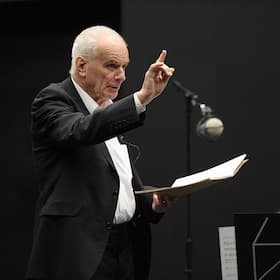
Peter Maxwell Davies
For Vaughn Williams, Scott’s epic failure stood at the center of his composition. He was entirely focused on the notion of man overcoming, subduing and taming a menacing and threatening nature. Atmospheric and environmental touches aside, Vaughn Williams locates the explorer as the focal point of the musical narrative. Roughly 50 years later, the Symphony No. 8 “Antarctic” by Peter Maxwell Davies makes no reference to humans at all; the environment has become the sole focus. The “Antarctic Symphony” was commissioned by the British Antarctic Survey, in association with the Philharmonia Orchestra to mark the fiftieth anniversary of the film “Scott of the Antarctic.” Maxwell Davies agreed to the commission under the condition that he was able to travel to Antarctica, “to experience the subject matter first hand.” The composer made the journey in 1997, and the single-movement work “uses sound images derived from his experiences in Antarctica.”
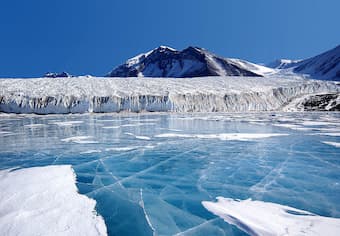
Antarctica: The blue ice covering Lake Fryxell in the Transantarctic Mountains
The composer reports, “Our ship…was unusually silent and free from vibration, so that one could appreciate the profound stillness of a totally flat sea, with no wind whatever, and exult in the light’s intensity, seeming to pulse from within ancient green and blue icebergs, and leap in eye-piercing shards from the endless expanses of snow and ice. All silence was shattered when the vessel rammed her way through the hard frozen sea—the ice crashing along the bows was one of the most exhilarating sounds I ever heard, with electric zippings and cracklings sounding off into the far distance as fissures extended for miles from the ship. Another extraordinary sound experience was… a gentle avalanche of snow from cliffs towering high.” According to Maxwell Davies, the sound of the ice-break and the avalanche “determined that I use a Pentecost plainsong, associated with the descent of the Holy Spirit upon the Apostles, in this palpably most un-Christian symphony. The new symphony cannot be described literally in terms of any programme associated with my Antarctic experience—it is, rather, an abstract work, using transmuted sound images distantly based on those experiences.” We must all do our part to assure that Maxwell Davies’ vision of the Antarctic does not merely become a sentimental sound document from the past.
For more of the best in classical music, sign up to our E-Newsletter
Peter Maxwell Davies: Symphony No. 8 “Antartic”

